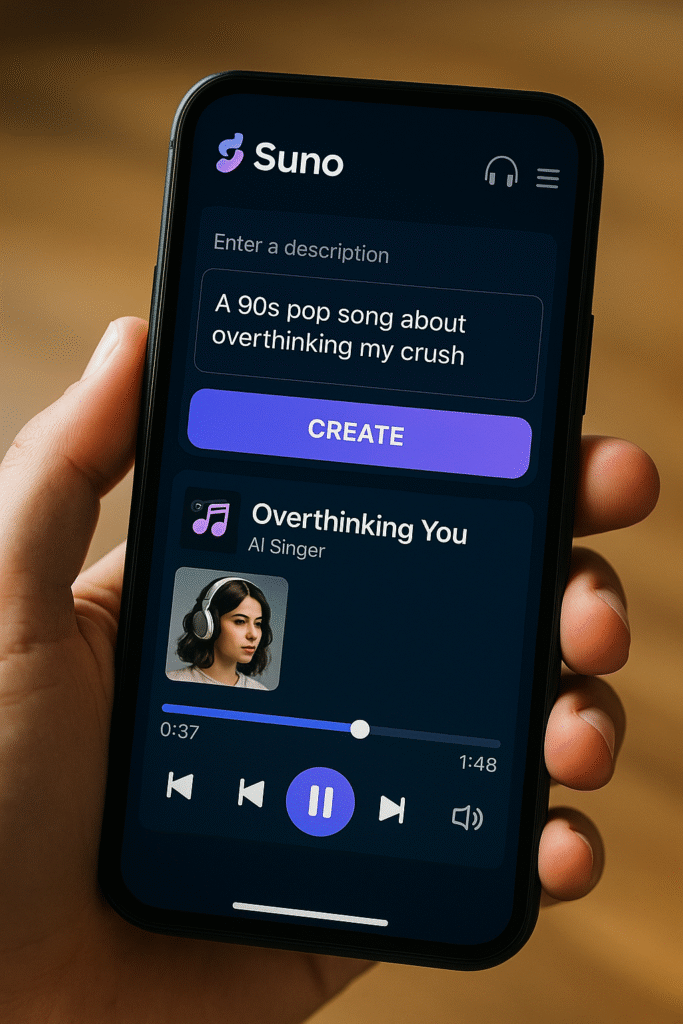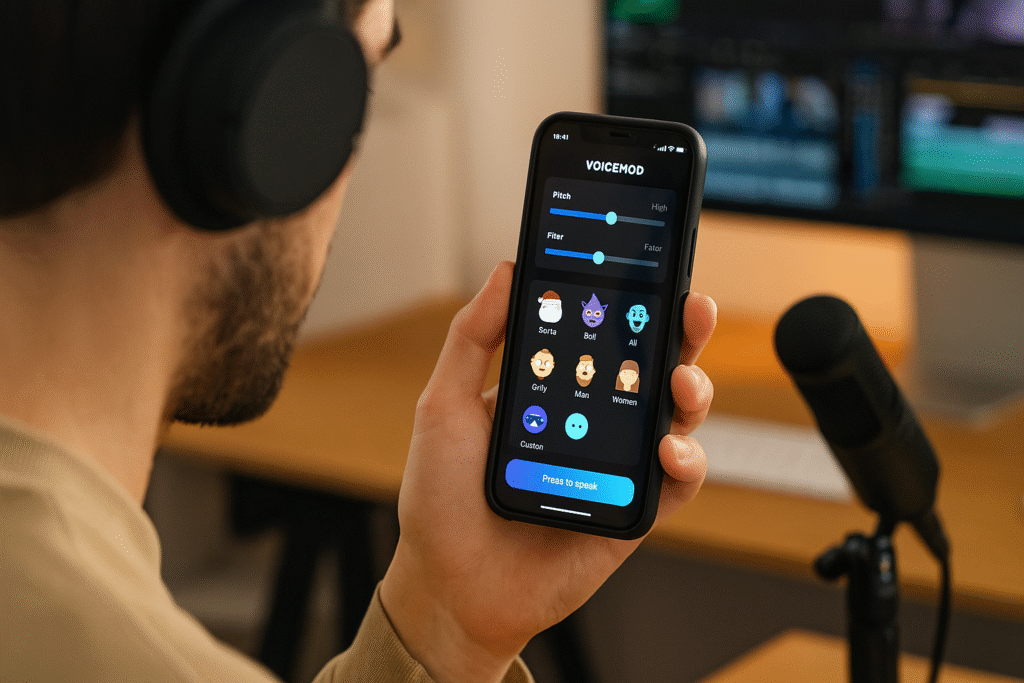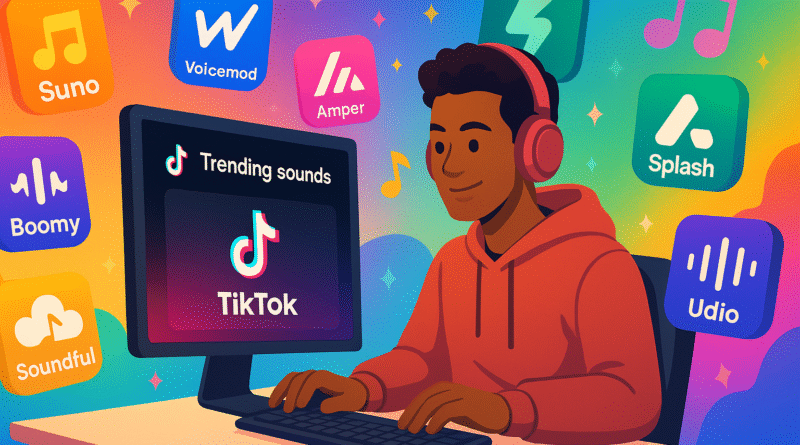7 Brilliant AI Music Tools Taking Over TikTok
AI Music Tools Introduction: How AI Music Is Taking Over the Internet
In 2025, the music industry is undergoing one of the most exciting, and disruptive, transformations in its history. And the epicenter of this change isn’t a record label, a concert stage, or even a studio in Los Angeles or Berlin. It’s TikTok.
Once dismissed as a short-form video app for teens, TikTok has evolved into the most powerful music discovery engine on the planet. It doesn’t just reflect trends, it manufactures them. A 10-second snippet can launch a career, revive a forgotten track from decades past, or shape the sound of an entire genre. But increasingly, what’s behind these viral audio moments isn’t just human creativity. It’s artificial intelligence.
Scroll through TikTok today and you’ll find songs that sound like they were made by chart-topping producers, except they weren’t. Many were generated by AI. From smooth indie beats to ridiculous parody tracks to pitch-perfect pop melodies, these audio clips are created with the help of powerful machine learning tools, some requiring little more than a typed prompt and a few clicks.
AI music tools have gone mainstream. What used to be experimental tech hidden in research labs or demoed at music tech conferences has now landed in the hands of everyday creators. The gatekeepers of traditional production, expensive software, advanced music theory, years of training, are slowly being replaced by interfaces anyone can use. With AI, even someone with no musical background can create a track, mix it, and distribute it globally within hours.
This democratization has led to an explosion of creative diversity. We’re seeing TikTok flooded with unexpected mashups, genre-defying compositions, emotionally raw vocal tracks made from text inputs, and ultra-niche songs crafted for micro-audiences, all generated or enhanced by AI.
It’s not just indie creators hopping on the AI bandwagon. Major labels, advertising agencies, and streaming platforms are also leveraging these tools to prototype songs, test audience response, and generate royalty-free background music at scale. AI isn’t replacing musicians, it’s becoming part of the production pipeline, from the first beat to the final mix.
And the influence doesn’t stop at TikTok. These AI-generated tracks are migrating to Spotify, YouTube, and Instagram Reels. Some are turning into full-length albums. Others are becoming memes that spawn entire subcultures. In every case, what was once seen as a novelty, “Wait, a robot made this?”, is now a viable and increasingly common way to make music.
The implications are massive. Music is no longer bound by geography, language, or traditional skill sets. A teenager in Kansas can collaborate with an AI-powered virtual singer in seconds. A skincare brand in Berlin can generate the perfect lo-fi background track for their ad without paying licensing fees. A meme creator in Jakarta can remix trending audio using a phone app and have it reach millions before dinner.
In short: AI has turned music from an elite craft into a globally accessible creative canvas, and nowhere is that more evident than on TikTok.
In this article, we’ll take a closer look at 7 brilliant AI music tools currently fueling this revolution. From text-to-song generators and mobile beat makers to voice morphers and auto-mixing engines, these tools are reshaping not just how music is made, but who gets to make it, and how fast it can spread.
So whether you’re a curious creator, a brand strategist, or just someone trying to understand why your feed is full of AI-generated bangers, this list will give you a front-row seat to the future of music.
Spoiler: it’s weird, wonderful, and absolutely here to stay.
1. Suno, AI Song Generator With Instant Hooks

Suno has become a favorite among TikTok creators thanks to its ability to generate full songs, lyrics, vocals, melody, from a single prompt. Want a 90s pop track about overthinking your crush? Suno can deliver in minutes.
It’s especially powerful for creators who want custom audio tracks but lack production skills. With AI-generated singers and genre controls, Suno empowers storytellers to match sound with vibe, instantly.
2. Voicemod AI, Voice FX for Viral Filters

Voicemod started as a voice changer for gamers, but its AI voice models are now fueling hilarious and viral audio trends on TikTok. From robot rappers to chipmunk breakup ballads, Voicemod lets users twist their voices into something instantly shareable.
Content creators use it to layer memes with unique sound design, or even to add personality to otherwise basic clips. With real-time rendering and voice packs for every mood, it’s a tool for those chasing quick virality.
3. Soundful, Royalty-Free Beats for Any Mood
Need a lo-fi beat for a montage or a synth drop for your skincare tutorial? Soundful generates royalty-free music tailored to mood, tempo, and genre, perfect for TikTok’s fast-moving trends.
It’s a godsend for influencers, brands, and micro-creators who need consistent background music that doesn’t risk copyright strikes. Soundful’s simple interface and export features make content-ready audio just a few clicks away.
4. Splash, AI Music Creation for Mobile Creators
Splash is designed specifically for mobile-first music creation. With a sleek app and intuitive controls, creators can build full tracks using AI-suggested loops, effects, and arrangements.
It’s especially popular among Gen Z users who treat TikTok as both a studio and a stage. Splash removes the friction between idea and audio, making it easy to remix, experiment, and post on the go.
5. Boomy, AI That Makes Releasing Music Frictionless
Boomy allows anyone to make and distribute music in minutes. With AI-assisted track generation and direct upload to Spotify, Apple Music, and more, it’s turning TikTok sounds into streaming revenue.
Many viral TikTok hits, including meme songs and character-based tracks, are now being created on Boomy. It empowers creators to experiment quickly, test audience reactions, and build passive income from unexpected hits.
6. Amper Music, Custom Scoring Without Composers
Used by brands and agencies, Amper provides high-quality, customizable scores that respond to video cues. TikTok creators are using it to add emotional weight to storytelling videos or trailers without needing a composer.
Its AI understands timing, tone, and energy, making it great for building cinematic vibes, whether you’re hyping a book review or crafting a fictional series on your page.
7. Udio, Collaborative Songwriting With AI Hooks
Udio brings a new layer of interactivity to AI music. It helps creators build custom verses, harmonies, and even call-and-response lyrics that work in viral formats.
What makes it stand out is the ability to co-write. You start with a vibe or a line, and Udio expands on it, crafting melodic ideas that are TikTok-ready. It’s ideal for creators who want more lyrical control but still need speed and support.
Why This Matters: Creativity Without Gatekeepers
These tools aren’t replacing musicians, they’re expanding what creativity looks like. They give people without formal training or expensive gear the ability to create with sound.
On TikTok, where audio is the engine of discovery, AI music tools unlock new levels of participation. They let someone with a story, a vibe, or a joke turn it into a musical moment, and potentially reach millions.
That’s the true power here: accessibility, experimentation, and viral potential, all accelerated by AI.
Final Thoughts: Music, Reimagined Through AI
The AI music revolution isn’t coming, it’s already here, shaping the future of sound in real time. On platforms like TikTok, AI-generated music has already proven its viral power, surfacing in everything from parody songs to heartfelt anthems, remix challenges to background scores for visual storytelling. What was once dismissed as a gimmick has now become a legitimate pillar of the music ecosystem, and it’s only accelerating.
We are entering an era where the definition of a “musician” is evolving. While traditional musicianship remains valuable and irreplaceable in many ways, the barriers to entry for creative expression have been radically lowered. Now, a teenager with a phone, an idea, and access to a free AI music tool can make a track that sounds like it came out of a professional studio. In many cases, that track can be uploaded, shared, and turned viral before breakfast.
This shift doesn’t mean AI is replacing artists. On the contrary, it’s giving more people the tools to become artists, in their own way, on their own terms. People who never had access to instruments, training, or expensive software now have the ability to experiment, compose, and even distribute original music. AI isn’t erasing creativity, it’s unlocking it at scale.
And the result? We’re hearing sounds the world has never heard before. Unexpected genre hybrids. Emotionally rich compositions crafted from text prompts. Voice-swapped collaborations that bend the idea of identity and authorship. Even jokes and memes are evolving into full songs with polished vocals, catchy melodies, and cinematic production, thanks to AI tools that handle everything from lyrics to mixing.
This is more than convenience. This is a cultural shift.
As more creators, from amateur hobbyists to chart-topping artists, begin experimenting with AI, we’re bound to see an explosion of sonic innovation. Songs will be written in multiple languages at once. Albums may be collaboratively generated with fan prompts. Live performances might include real-time audience-driven song modifications, generated on the spot by AI.
Yes, there are important conversations to be had around ethics, ownership, and originality, especially as AI music becomes harder to distinguish from human-made work. Who gets credit? Who owns the rights? How do we make sure creativity isn’t cannibalized by automation?
But these challenges are not reasons to halt progress. They are signs that AI is now fully embedded in the creative process, and that it’s time to build frameworks that celebrate both innovation and integrity.
One thing is clear: the next big sound won’t come exclusively from a glossy studio in L.A. or a viral marketing campaign. It might come from a bedroom in the suburbs, a dorm room halfway across the world, or a kid on a bus writing lyrics into a text-to-song generator.
And that’s the beauty of it. Music is being reimagined not just through AI, but through the human desire to connect, to create, and to be heard.
The future of music isn’t human or machine.
It’s human + machine.
And if what we’re hearing so far is any indication
it sounds brilliant.
